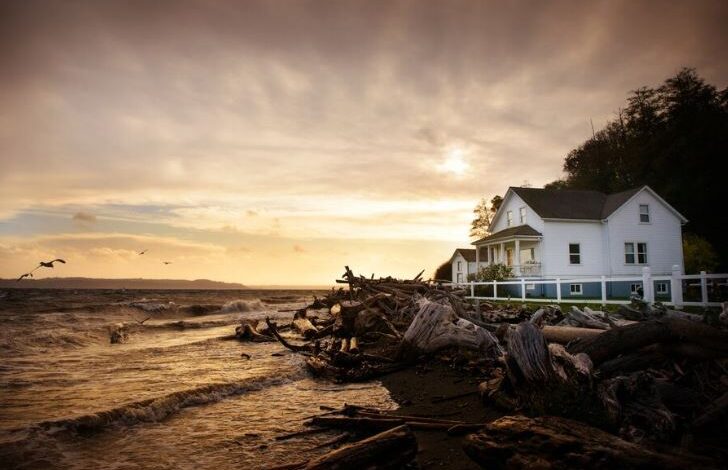Choosing the Perfect Coastal Home: What to Consider

Key Takeaways
- Learn about the essential factors to consider when choosing a coastal home.
- Understand the impact of location, weather, and community on coastal living.
- Discover valuable resources and tips for making an informed decision.
Location Matters
When choosing a coastal home, the location is paramount. Coastal regions offer diverse environments, from bustling tourist hotspots to serene, secluded beaches. Deciding whether you prefer a lively neighborhood or a tranquil escape is essential for long-term satisfaction. For instance, if you’re exploring homes for sale in Narragansett RI, it’s crucial to consider what type of coastal experience you desire. Narragansett, known for its beautiful beaches and rich history, offers a variety of options for different lifestyles, blending convenience with the appeal of natural beauty.
Additionally, proximity to essential amenities and attractions can significantly influence your decision. Coastal living often means easy access to recreational activities such as boating, surfing, and beachcombing, which can dramatically draw families and retirees. Consider the availability of public transportation, the quality of nearby schools, and the distance to essential services like hospitals and grocery stores. Evaluating these factors will ensure that your coastal home meets your immediate needs and long-term lifestyle goals.
Weather and Climate Considerations
Living by the coast means embracing the local weather patterns. Consider aspects such as hurricane prevalence, humidity levels, and seasonal changes. These factors significantly impact your day-to-day living and property maintenance. Consistent exposure to saltwater can affect building materials, necessitating regular upkeep and weather-proofing measures. For instance, wooden structures may need more frequent painting and sealing to prevent damage from salt and moisture.
Being informed about your local climate will help you prepare for and adapt to coastal living’s unique challenges and benefits. Understanding your area’s microclimate can also aid in selecting suitable construction materials and planning appropriate landscaping to mitigate potential weather-related issues.
Community and Amenities
The community and available amenities are crucial to your coastal living experience. Look for essential services, recreational facilities, and the overall vibe of the community. Proximity to schools, hospitals, and shopping centers can add unmatched convenience to your lifestyle. A thriving local economy can also enhance your experience, offering leisure activities and cultural events that enrich your day-to-day life.
Exploring local markets and eateries can give you a sense of the day-to-day atmosphere. Participating in community events or visiting local clubs and social groups can provide deeper insights into the community spirit. Consider the community’s demographic makeup and cultural aspects. The right combination of community features will make your new home comfortable and convenient.
Costs and Finances
Understanding the financial aspects of buying a coastal home goes beyond the purchase price. Property taxes, insurance, and potential maintenance expenses must be factored into your budget. Saltwater and weather exposure often demand more frequent upkeep, potentially increasing overall costs. For example, landscaping maintenance may require plants and materials that can withstand salty air and high winds.
Insurance is another significant consideration. Coastal homes may require specialized policies that include windstorm, flood, and hurricane coverage. Get quotes from multiple providers to ensure comprehensive protection at the best possible rates. Additionally, inquire about any homeowner association fees and what they cover. Understanding all financial obligations will give you a clearer picture of the cost of coastal living.
Inspection and Safety
A thorough inspection is critical when purchasing a coastal property. Professionals should assess Erosion, flood risk, and structural integrity. These specific issues are more prevalent in coastal areas. They can significantly impact the property’s longevity and safety. Erosion can gradually reduce the land around your home, affecting your property and potentially your neighbors.
Safety measures should also be considered. Incorporating storm shutters, elevated structures, and proper sealing can help protect your home from severe weather conditions. Regular maintenance and timely repairs can prevent minor issues from becoming major concerns, ensuring your investment remains secure. Also, consider local building codes and FEMA coastal construction recommendations to ensure your home is built to withstand local weather conditions.
Resale Value
Thinking ahead about the resale value of your coastal home is wise. Coastal properties tend to appreciate over time, especially in desirable locations. However, it’s essential to choose a location with growth potential and maintain your home well to ensure it remains attractive to future buyers. Homes that are well-kept and modernized are likely to see better appreciation rates.
Keeping your property in good condition and up-to-date with modern amenities can significantly boost its resale value. Eco-friendly features and energy-efficient systems are increasingly appealing to buyers, adding another opportunity to enhance your property’s worth. For example, a beautiful, well-maintained garden can add curb appeal and attract potential buyers. Staying informed about market trends and making intelligent improvements can help ensure your investment pays off when it’s time to sell.
Keep an eye for more news & updates on TechProMagazine!





